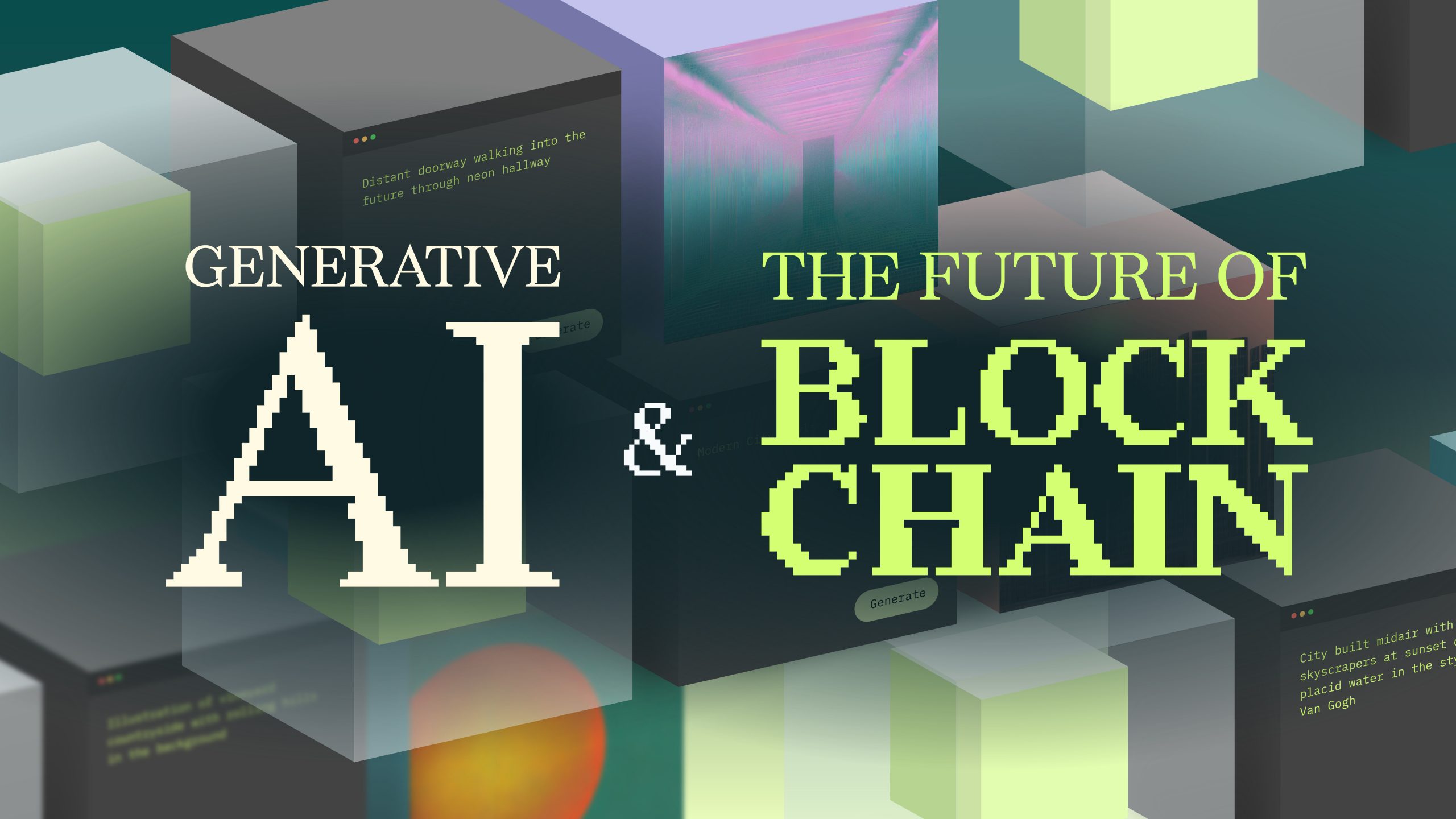Generative AI and the Future of Blockchain
Generative AI, a subfield of artificial intelligence, is taking the world by storm. While many people have become familiar with large language models, like Open AI’s ChatGPT, a form of generative AI that creates new text from scratch, generative AI is also capable of producing other forms of content like images, videos, and music. With its multitude of computer-generated applications, generative AI stands to truly transform the way that businesses function and interact with customers.
Alongside its tremendous potential to change businesses for the better come real fears about how generative AI might threaten jobs by automating many kinds of work across industries. Even white-collar professionals may see their business functions become obsolete due to AI-driven automation. Additionally, 79% of IT professionals surveyed have concerns that introducing generative AI to their business may pose security risks. Pairing blockchain technology with AI models provides a resolution to many of these concerns.
The combined benefits of AI and blockchain are numerous. From data validation to enhanced data security, together blockchain and AI have the power to produce novel applications previously never considered.
Below we will highlight the converging values of AI and blockchain when it comes to validation, security, and even less explored fields like gaming. In tandem, these two transformative technologies become greater than the sum of their parts.
Validation in the Age of Generative AI
For generative AI outputs to be useful, data inputs must be trustworthy and traceable. Blockchain validation presents the ideal solution, elevating trust in the content’s authenticity and ensuring data integrity.
AI-generated content quality relies on the caliber of data the artificial intelligence can access. Storing this data on the blockchain affirms the accuracy of AI-generated content outputs. The inherent immutability of the blockchain provides transparency in AI decision-making. For example, the digital ledger can create a bibliography of sources used in text generated by a large language model, preventing AI plagiarism.
As AI-generated content continues to gain prominence, blockchain technologies will also be useful in differentiating between fake AI-generated data and an original dataset. Blockchain’s ability to assist users in authenticating images, videos and other forms of content, safeguards the digital future of society.
Security in the Age of Generative AI
The decentralized nature of blockchains helps to build AI models on a foundation of truly secure and tamper-resistant data. Since data is stored across a network of many nodes, no single attack point can compromise an entire blockchain-based system.
These models are specifically built to be resilient to manipulation, including threats from potentially adversarial AI agents. As AI capabilities expand so does the possibility of such attacks, increasing the need for higher degrees of data security. Like any emerging technology, AI can be used for good or for ill. The malicious use of generative AI has the potential to drive distrust and chaos in the internet ecosystem. Abusive uses of AI by hackers include a wide range of possible scenarios, including shrouded phishing and deep fake scams as well as the ability of AI to “poison” a system’s dataset. Although there are no perfect solutions, the use of blockchain can protect databases from various attack vectors by enabling data auditability, provenance, and transparency.
Future Uses of Generative AI and Blockchain
Transformative blockchain projects will continue to proliferate within new and unexpected fields in the future. While AI and blockchain’s value appears obvious in certain industries such as the financial services sector, these technologies offer solutions across many novel applications.
One such example is the impact that generative AI can have on blockchain gaming. Here, the power of generative AI can be harnessed to create personalized digital assets for players, which in combination with NFTs, can be traded in a digital in-game economy.
Coupling the interoperability capabilities of technology like Chia’s CODE framework with the power of generative AI brings increased game customization to a whole new audience of gamers by streamlining the process for creating and trading new, personalized digital assets.
This infrastructure enables more engaging and functional games that also empower players to become developers themselves. Together, these technologies unlock a gaming system’s full range of creativity and support robust in-game economies by assisting in the production of tradable assets.
The possibilities don’t end there. When it comes to the dual powers of blockchain and AI, the sky’s the limit.
FAQ
Q: What is generative AI?
A: Generative AI is a subfield of artificial intelligence with the ability to create content, such as text, images, videos, and music in response to prompts.
Q: How can generative AI and blockchain work together?
A: Ranging from data validation to enhanced data security and beyond, the combined benefits of AI and blockchain are widespread. Blockchain’s decentralization, immutability, and auditability improves trust in generative AI’s content authenticity, data integrity, and overall system security.
Q: How can AI and blockchain improve data security?
A: Blockchain’s decentralization ensures AI models are built on a foundation of truly secure and tamper-resistant data resilient to manipulation. The use of blockchain can protect AI databases from various attack vectors by enabling data auditability, provenance, and transparency.
original source – www.chia.net/2023/06/26/generative-ai-and-the-future-of-blockchain/

You must be logged in to post a comment.